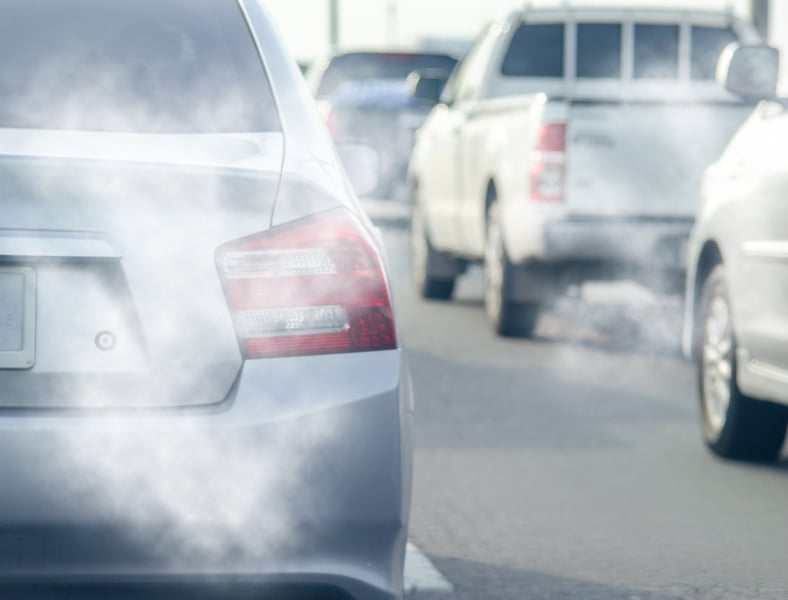Get Healthy!

- Posted August 9, 2023
Breathing Dirty Air Raises Odds for Wide Range of Cancers
New research links air pollution to a variety of cancers, not just lung cancer.
Long-term exposure to fine-particulate air pollutants (PM2.5) and nitrogen dioxide (NO2) may also increase the risk of developing colon, prostate and other cancers, researchers found.
"What we're seeing is that with air pollution we're looking at thousands of additional cases of cancer per year in the country," said senior researcher Joel Schwartz, a professor of environmental epidemiology at Harvard T.H. Chan School of Public Health in Boston.
The pollutants Schwartz is referring to are caused by combustion.
"They don't just come from cars and trucks, they come from any kind of combustion -- wood burning stoves, power plants that burn coal, other kinds of fuel facilities -- they're all producing combustion particles," he said.
Air pollution not only is related to cancer but to lung and heart disease as well as dementia, Schwartz said.
"People think a particular exposure causes a particular disease, but air pollution doesn't really work that way," he said. "Air pollution interferes with some basic processes in the body that influence all kinds of health outcomes."
Air pollution can increase the risk for diseases like cancer by increasing inflammation all over the body. Also, it increases oxidative stress, which causes cell damage, and inhibits the body's ability to repair that damage, Schwartz said.
For the study, the researchers collected data on millions of Medicare recipients, from 2000 to 2016. None had cancer before age 75. Schwartz's team also created groups to look separately at breast, colon, endometrial and prostate cancer, with between 2 million and 7 million people in each group.
They study found that chronic exposure to PM2.5 and NO2 increased risk for colon and prostate cancers, but not for endometrial cancer. NO2 exposure was linked to a decreased risk for breast cancer, while any association for PM2.5 was inconclusive.
The risk for these cancers was seen even where pollution was below national standards, the researchers noted. Even communities with clean air are not immune to cancer risk, they said.
They also found evidence that communities with higher average body mass index (BMI) may face greater risk of all four cancers due to NO2 exposure. BMI is a measure of body fat based on height and weight.
In addition, the analysis showed that Black people and those enrolled in Medicaid, government-subsidized insurance for low-income people, may be more susceptible to prostate and breast cancer from PM2.5.
PM2.5 and NO2 levels are produced by traffic, and people who live near highly traveled roads and highways tend to get more exposure to these pollutants. Because low-income people tend to live in high-traffic areas, this might explain the increased cancer risk among Black Americans and those on Medicaid, Schwartz said.
To reduce the risk polluted air poses, Schwartz said getting rid of the sources is really the only way.
That means making cars and trucks and power plants less polluting and refitting older vehicles to curb emissions. He said it might also mean banning wood-burning stoves.
"The government has to do a better job of reducing their exposure," Schwartz said. "It's not like something you or I can do."
W. Ryan Diver, director of data analysis at the American Cancer Society, said this study attempts to link air pollution to some cancers not usually associated with air pollution.
"The question has been whether pollution is associated with other cancers quite as strongly as lung cancer -- this study does add to that evidence," said Diver, who was not involved with the new research.
"We've seen a little bit stronger evidence for breast cancer with NO2, which comes from traffic-related pollution and this study supports that," he said. "But for other types of cancer, in particular, for prostate cancer, there hasn't been a lot of consistent evidence that air pollution is associated with it."
Even if proof of the link between the cancers studied and air pollution isn't rock-solid, Diver emphasized that cleaner air is an important goal.
"There's a lot of evidence that lower air pollution is better for health in general," he said. "Even if there aren't strong associations with some cancers, there's plenty of associations with many different diseases, including heart disease, stroke and lung cancer, so there's already plenty of evidence to go ahead and reduce air pollution levels."
The research was recently published online in the journal Environmental Epidemiology.
More information
The U.S. National Institute of Environmental Health Sciences has more about air pollution and your health.
SOURCES: Joel Schwartz, PhD, professor, environmental epidemiology, Harvard T.H. Chan School of Public Health, Boston; W. Ryan Diver, MSPH, director, data analysis, American Cancer Society, Atlanta; Environmental Epidemiology, Aug. 1, 2023






